A Common Pledge: Advancing the Unique Role of Women and Young Women of Faith Mediators
October 2025
In 2023, women made up only 9.6 percent of negotiators, 13.7 percent of mediators, and 26.6 percent of signatories to peace agreements and ceasefire agreements. Yet, evidence demonstrates that negotiated peace agreements are 35 percent more likely to be in place 15 years later if women are involved in the process. To address these low percentages, last year the UN Secretary General announced the launch of the ‘Common Pledge for Women’s Participation’ to prioritize women’s meaningful inclusion across peacebuilding and mediation processes.
In alignment with the pledge, the Multi-Faith Advisory Council (MFAC) to the United Nations (UN) Inter-Agency Task Force (IATF) on Religion and Sustainable Development and members of the IATF on Religion and Development co-hosted a high-level event exploring innovative solutions and recommendations for the UN, Member States, and other actors involved in peace efforts to support and amplify the role of women and young women faith-based mediators in promoting sustainable and long-term peace processes. The event, ‘A Common Pledge: Advancing the Unique Role of Women and Young Women of Faith Mediators,’ was co-organized by the Gender Working Group and the Peace and Security Working Group of the MFAC in recognition of the 25th anniversary of the UN Security Council Resolution 1325 on Women, Peace and Security (WPS), welcoming a diverse coalition of faith leaders, UN representatives, and civil society actors. Click here to watch the event recording.
Jessica Roland, Senior Specialist on Inclusive Peace at the Network for Religious and Traditional Peacemakers (NRTP), opened the event as Co-Chair of the MFAC Gender Working Group. Roland emphasized that the WPS agenda has been critical in ensuring that women are active in mediation processes, underscored by the pledge from the Secretary-General calling for everyone to take concrete steps to ensure women’s full, equal, and meaningful participation. She stated that women and young women faith-based mediators are building bridges where others only see barriers, despite experiencing intersectional discrimination, as “Women of faith mediators draw upon moral authority, deep community trust, and spiritual wisdom to heal divisions and mediate peace.” Roland highlighted multiple key actions to support women and young women of faith mediators, including building partnerships, addressing psychosocial needs and economic empowerment, and providing long-term and flexible resources.
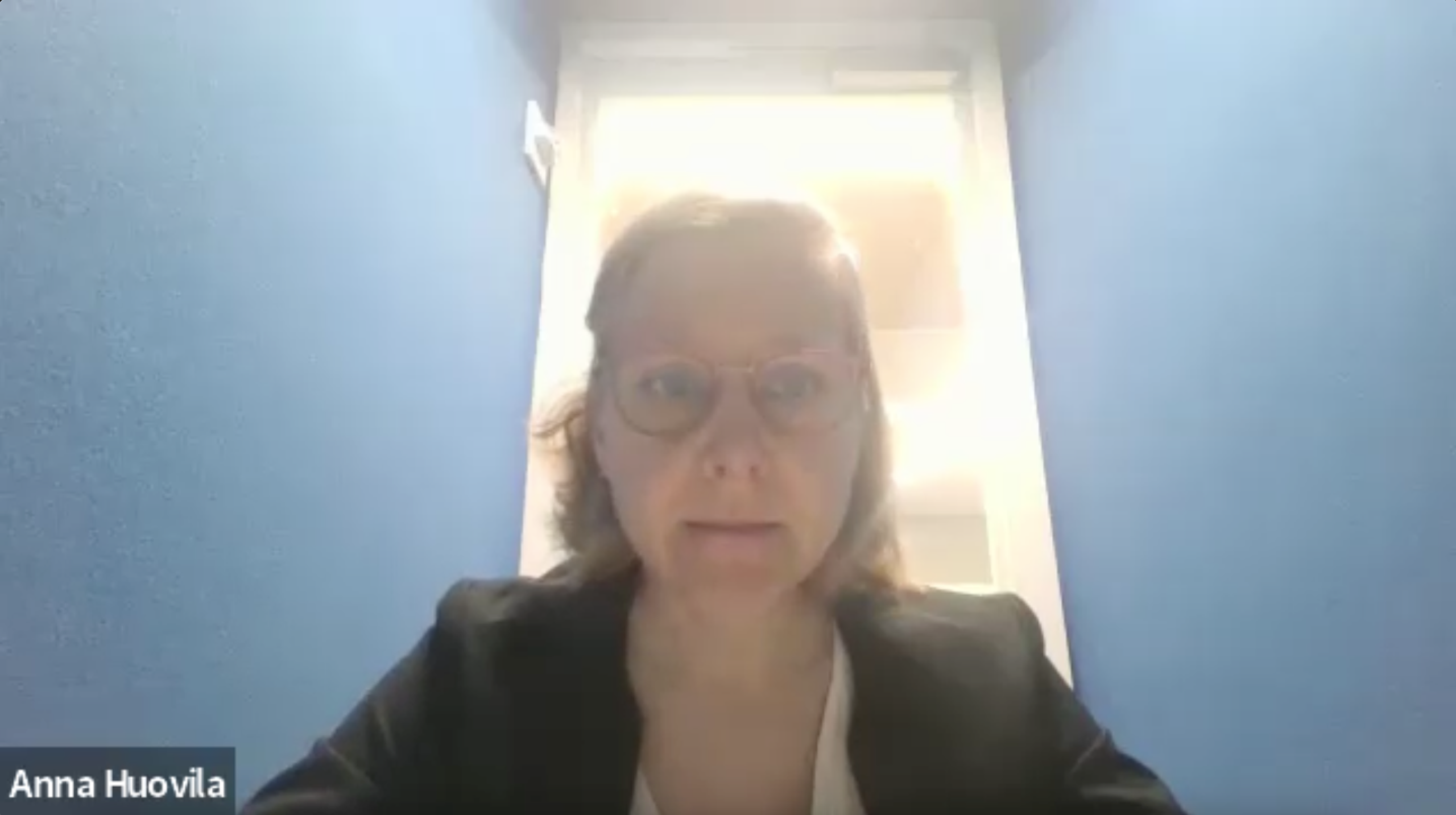
Anna Huovila provides high-level opening remarks calling to support “complementarity and cooperation amongst different actors.”
During her high-level opening remarks, Anna Huovila, Minister Councillor and Head of Unit for Peace and Security for the Permanent Mission of Finland to the UN in New York, and Co-Chair of Group of Friends on Mediation, reiterated the landmark importance of the WPS agenda, and advocated for the need work together, listening and learning to benefit from the complementarity of different actors in peace mediation processes. Huovila pinioned the value of engaging through diverse roles and channels of influence, including working with opposition and ‘gatekeepers’ to engage in dialogue, as the role women play in informal processes cannot be overlooked. She stressed that it is essential to platform and partner with women working in local and informal capacities, stating, “Local women actors have an instrumental role in ensuring women’s inclusion in conflict-sensitive manners.” She finished her remarks with a call to action to ensure that the participation of youth is a crucial element of peace and security work, engaging with youth in all their diversity and championing the WPS and Youth, Peace, and Security (YPS) agendas at the forefront.
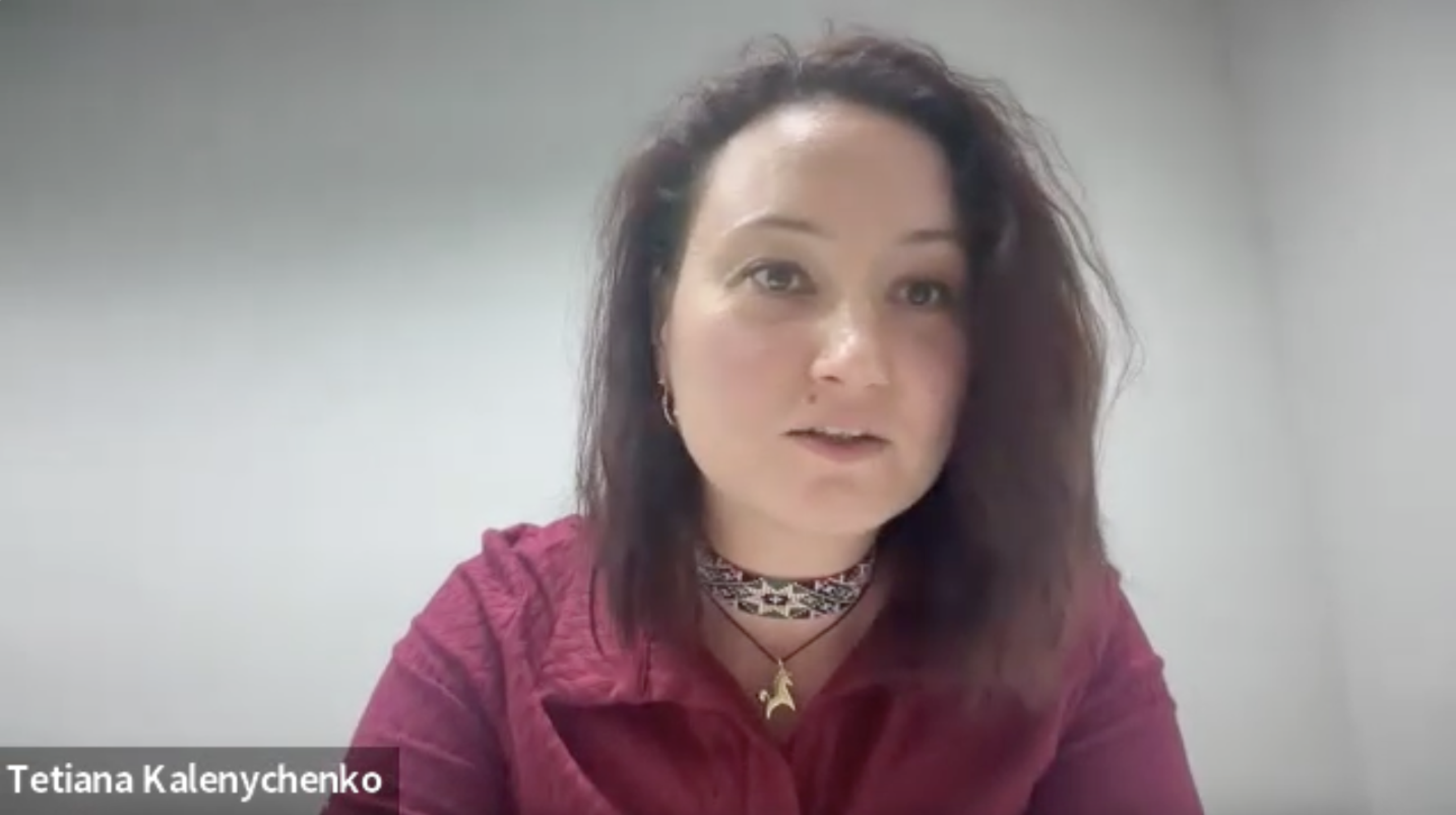
Tetiana Kalenychenko urges for the diverse inclusion of women from different backgrounds in local mediation processes.
Following, Christina Shaheen, Standby Team for the UN Mediation Support Unit, UN DPPA, moderated a panel discussion highlighting success stories and best practices. Tetiana Kalenychenko, Head Management at Action in Dialogue, shared that in Ukraine there are women mediators from different faiths, backgrounds, and cultures coming together and developing practices to ask difficult questions and talk about taboo topics. This is in stark contrast to when the war started in 2014, when mediators were traditionally men only, led by pastors or priests, and a woman faith-based mediator was not common. Kalenychenko emphasized the value of promoting local ownership, including taking a multi-track approach and bringing together men, women, and young mediators with agency to mediate their own groups and design trainings. She called to focus on the idea of systemic change, urging that mediators are strengthened by cooperating with global partners and connecting local struggles to other conflicts and, “with the richness of diversity, it’s possible to make a big global change together.”
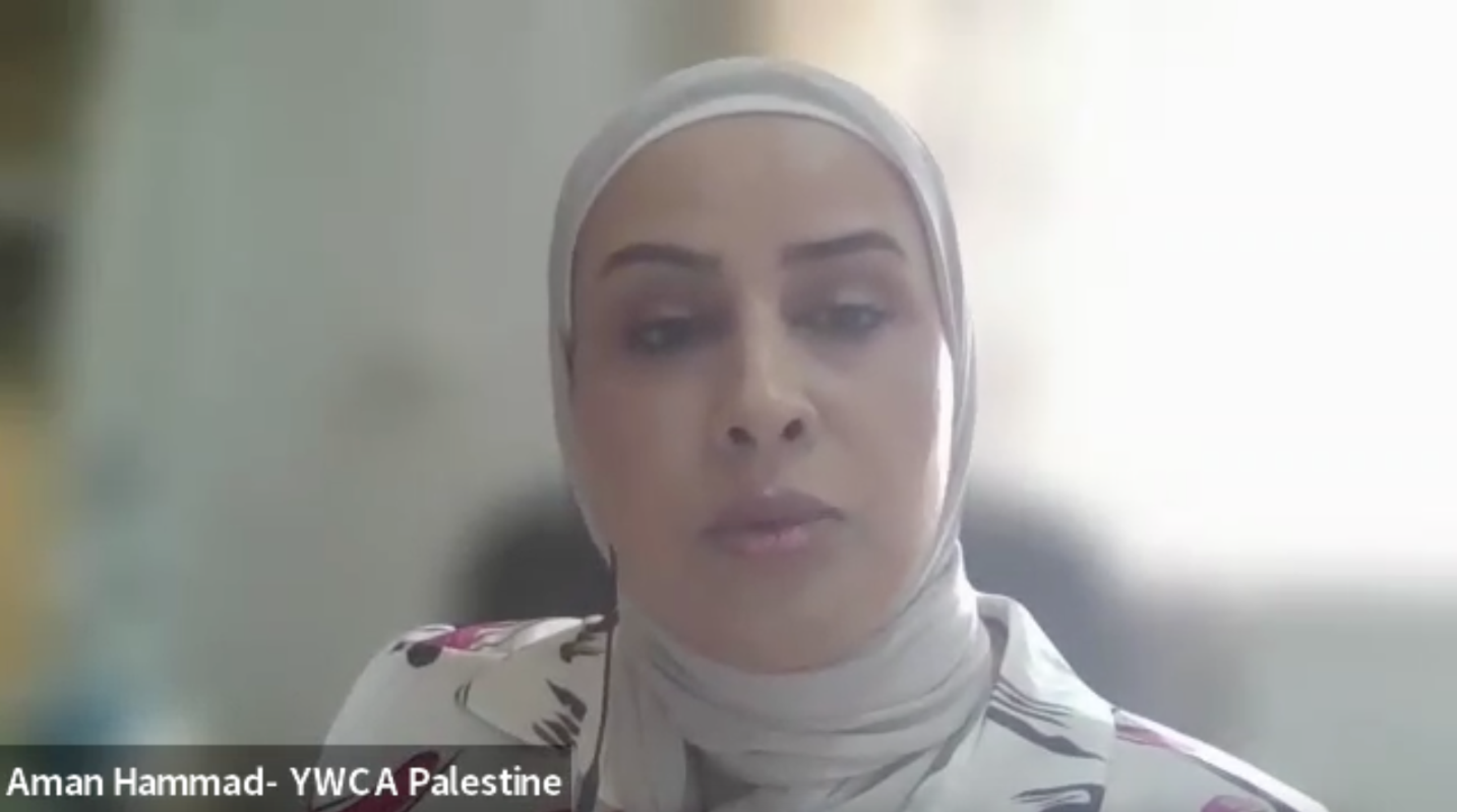
Aman Hammad describes Palestinian women utilizing shared religious values to bridge divides and encourage dialogue.
Aman Hammad, MEAL Officer for YWCA Palestine, provided further localized context, sharing examples on the importance of faith mediation and “the engagement of Palestinian women of faith who showed courage through stepping into roles, including mediating disputes, creating safe spaces, and pressing governments and institutions to uphold commitments under UN Security Council Resolution 1325.” Hammad highlighted how young women are using shared religious values as faith mediators to bridge divides and challenge harmful norms, encouraging peaceful conversations on issues including gender-based violence and family law. She reinforced that there is strength in promoting shared religious values to influence social norms and achieve advocacy objectives, asserting that the value of engaging women and young women faith-based mediators in influencing social norms change and legal reform cannot be understated.
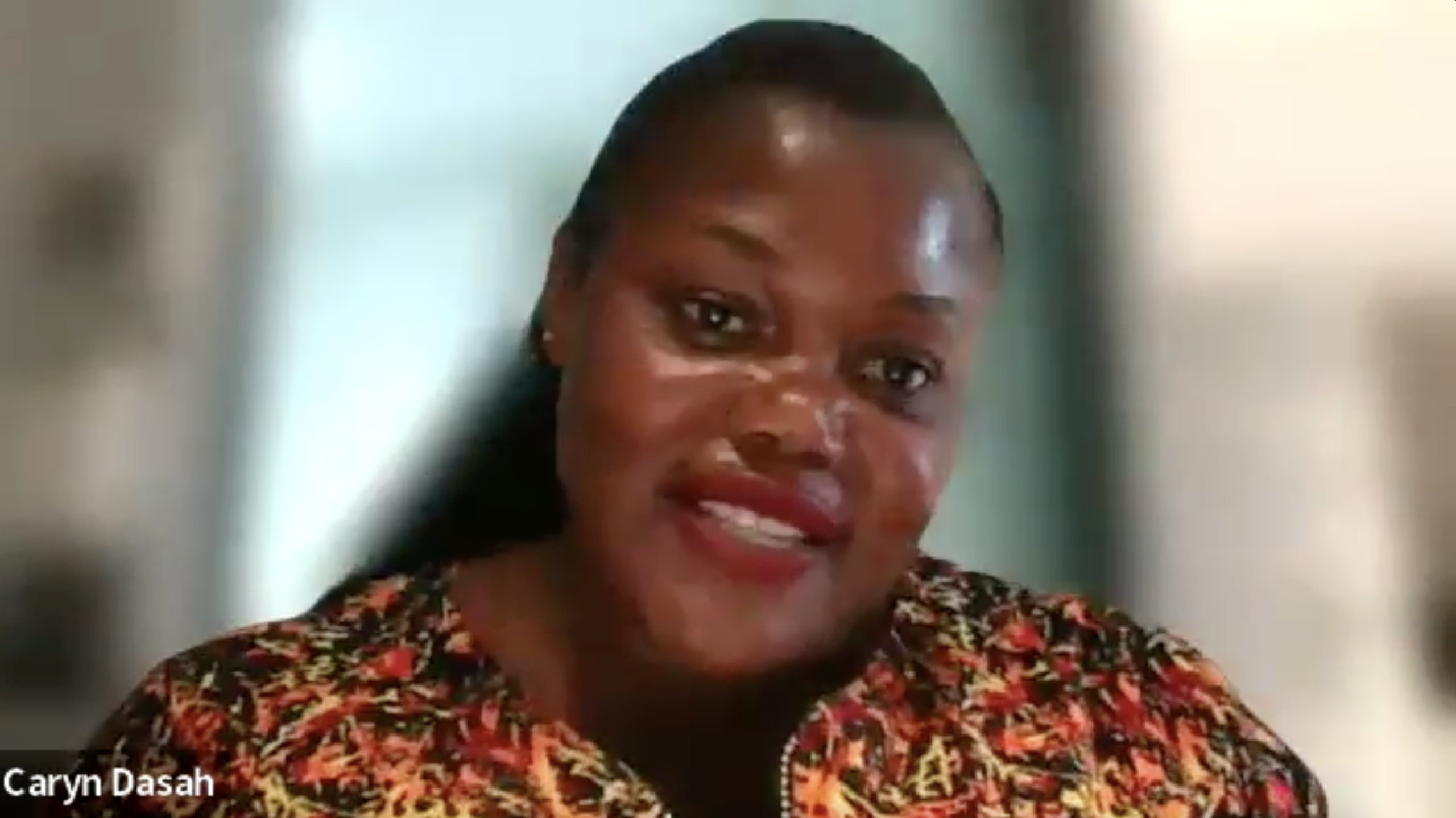
Caryn Dasah speaks about the importance of localizing the WPS agenda and promoting its relevance to communities.
Following, Caryn Dasah, CEO of Hope Advocates Africa, stressed that on the 25th anniversary of the “Bible of women peacebuilders,” there are still communities of women who do not know about the existence of Resolution 1325 or its impact on them and their work as mediators. Dasah emphasized the importance of advocating for women’s meaningful participation in peacebuilding and mediation at all levels. She highlighted the need to advance the WPS agenda within communities by organizing localization workshops to promote the Resolution’s relevance and ensure women’s inclusion in all aspects of community mediation processes. She advocated for the urgent need to provide access to funding as “organizations are crying everywhere.” In an impactful reflection as a young woman at the intersection of the YPS and WPS agendas, Dasah called for “ensuring that we are not only seen as the world sees us… as the troublemakers, but ensuring that they understand the role that women, young women like myself, play in building peace.”
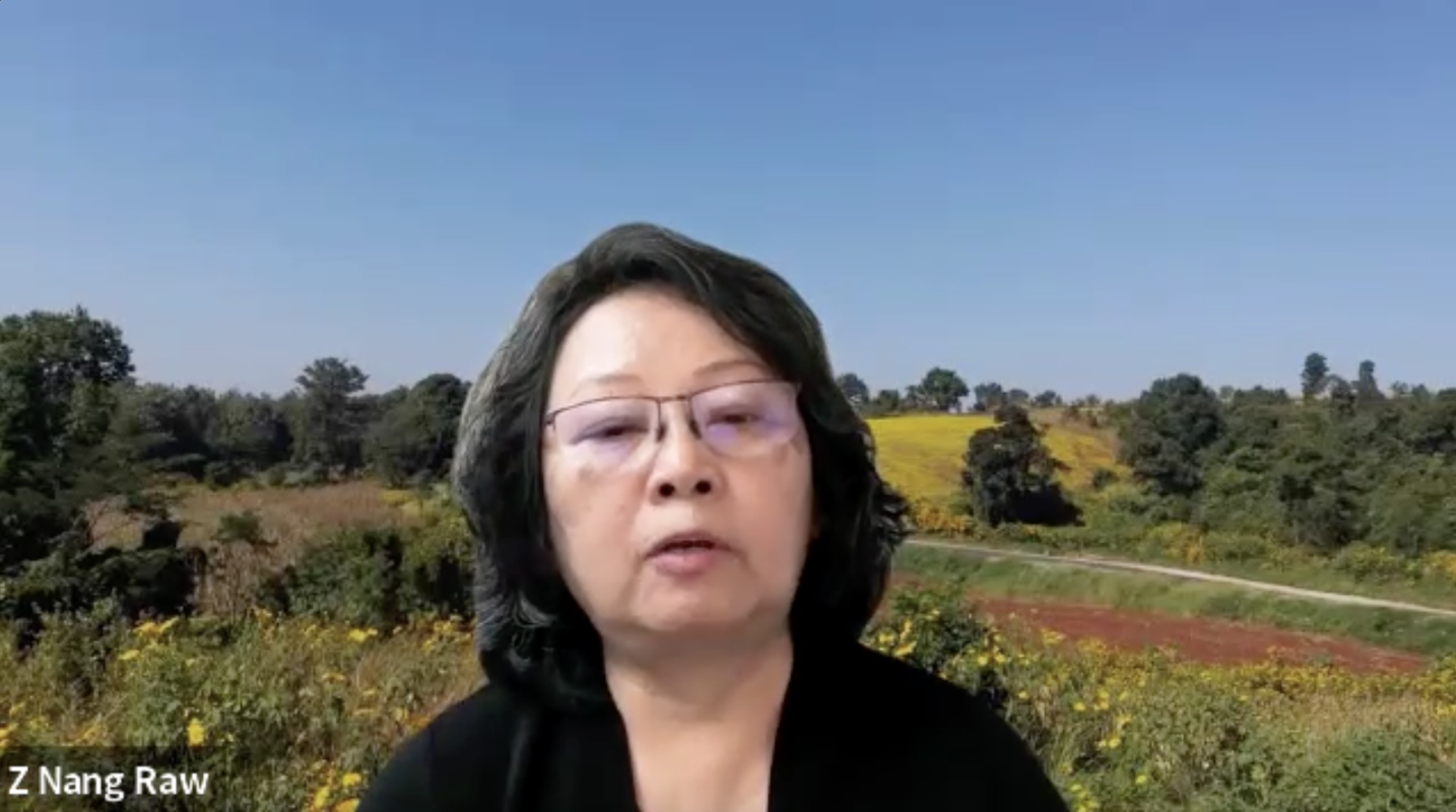
Z Nang Raw advocates for platforming youth faith-based leaders that are using religion as a force for peace.
Z Nang Raw, Facilitator and Mediator for Southeast Asian Women Peace Mediators, expanded upon her experience as a facilitator and mediator through Myanmar’s protracted conflict, emphasizing that when root causes are not addressed, conflict becomes cyclical, deepening the structure of violence. She warned of the dangers of cultural violence legitimizing violent structures and institutionalizing inequality, stating that it is essential to understand both the structure and culture of violence in protracted conflicts in order to grasp the comprehensive knowledge and nature of the conflict. Z Nang Raw also highlighted the value of interfaith youth programs, and the importance of platforming the leadership of trusted youth actively involved in the religious hierarchy from across different faiths, as “youth already know religion is not to fight but to make peace.” She affirmed that the key priority should be continuing support for women and young women, including trainings on mediation, negotiation, and dialogue facilitation.
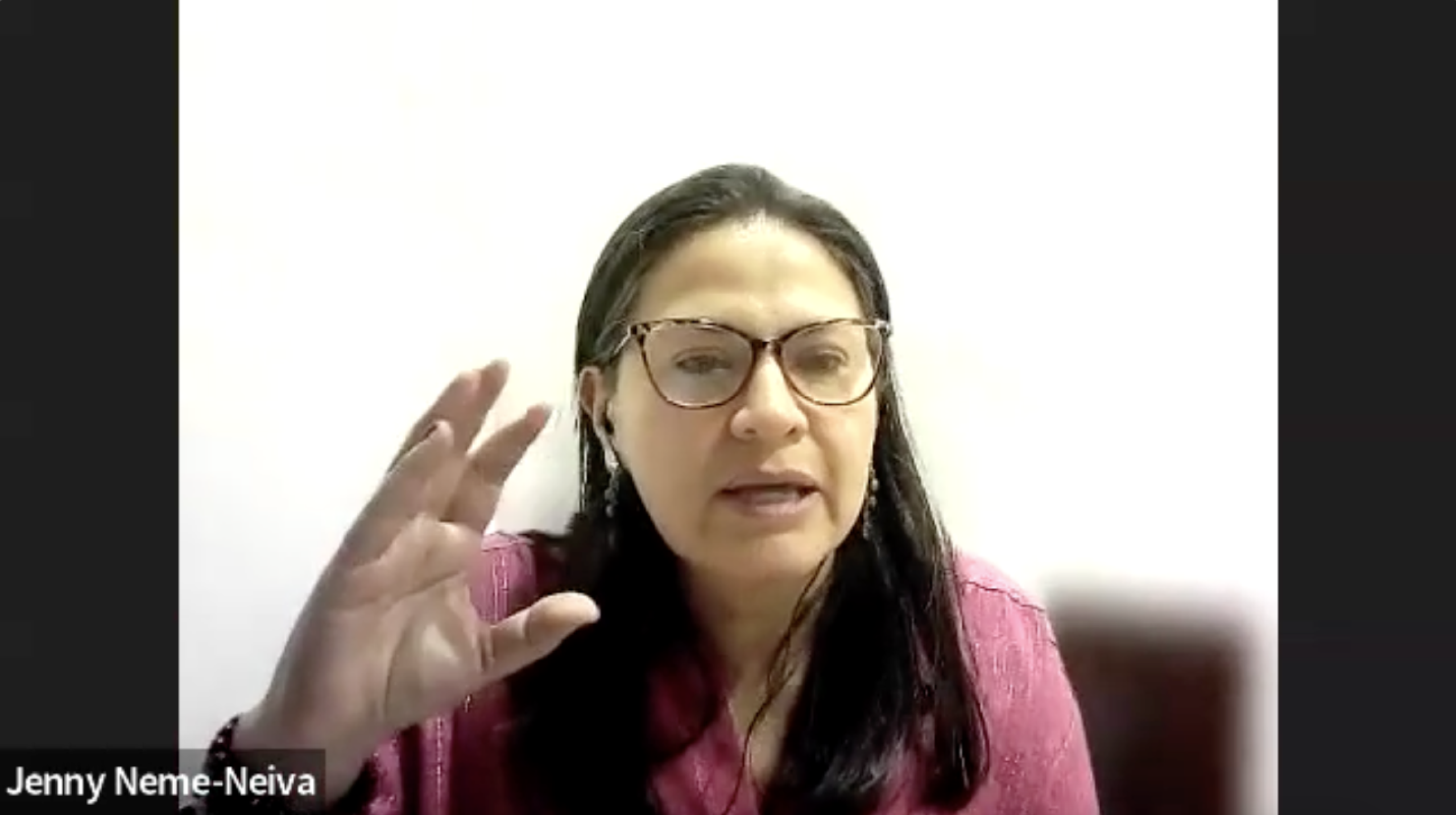
Jenny Neme speaks about Colombia’s longstanding history of civic and faith-based engagement in mediation processes.
Jenny Neme, Deputy Special Envoy in Colombia for the Peace Process, World Council of Churches/ACT Alliance, then spotlighted her work in Colombia, emphasizing Colombia’s long history of conflict and armed violence, expertly negotiated military exits, and strong Christian and Catholic background. Neme highlighted mobilization in Colombian civil society alongside churches to find exits to armed conflict, with the presence of women pastors woven into the mechanism of the ceasefire, lending “continued support to the civil societies and communities of faith.” She stated that it is essential to recognize the suffering of civil society during humanitarian crises and urged for support within religious communities to challenge gendered perspectives and recognize the difficulties of working in peacebuilding and mediation. Neme closed with a call to action to advocate for the diverse participation of women and young women as gender is increasingly rejected in peacebuilding, including measurements for protection and safety and an intentional agenda with local churches to protect the role of women in local conflict mediation.
The event then progressed into breakout groups, allowing participants to share their experiences and best practices for supporting women and young women faith-based mediators. Participants also explored ways they could build on the UN Secretary General’s Call for Common Pledges for advancing women’s participation in peace processes. In the closing remarks, Debra Boudreaux, Peace and Security Working Group Co-Chair, Chief International Affairs Officer for the Buddhist Tzu Chi Foundation, underscored that the 25th anniversary not only commemorated Resolution 1325, it “reaffirmed our collective commitment to action.” Boudreaux reaffirmed that women of faith mediate at great risk, building trust where there is division, increasing morale, and ensuring the endurance of peace agreements. She stated it is essential to continue with a spirit of courage and accountability in policies, partnerships, and daily realities, highlighting women mediators as indispensable. Boudreaux emphasized that “the WPS agenda will be defined not only by exclusion, but by inclusion; not only by silence, but by amplifying the voices of women and young women of faith mediators.”
Follow the Peacemakers Network on social
